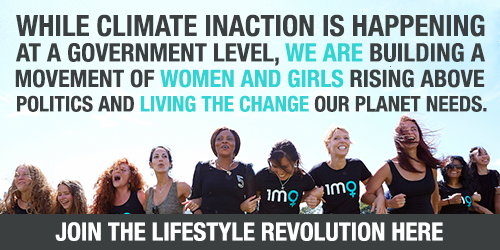If you've flicked on the news recently, you're probably feeling like the world is a pretty frustrating place. You carry your reusable cup everywhere, you compost, you never forget your reusable bags, you take public transport and everything you buy is from an ethical, sustainable source. And yet, the planet continues to burn (literally and figuratively).
But there is one more thing you can do. (And don't worry, we're not about to tell you that you need to bring another reusable thing everywhere with you).
It's your banking. It's probably not what you expected, but who we all bank with has a massive impact on the fossil fuel industry. It's not all just politicians and big CEOs in charge here, it's you too!
Wait what? How?
Big banks are the reason that fossil fuel projects are able to go ahead. Businesses that want to start big new projects rarely have the upfront money to get them off the ground, so they take out loans, and the fossil fuel industry is no different. Fossil fuel companies will take out massive loans from banks to fund their coal mines and oil drilling. And those loans come from the money in our bank accounts, or from the interest on our home loans! Yep, that's right, it's not all just sitting there in a big vault like we imagine.

[A Gringotts Bank vault at Harry Potter World aka. what we think our bank accounts looks like]
The big banks often loan money out to lots of things that you might not ever dream of supporting. Things like weapons, tobacco, or industrial animal agriculture, along with those huge, controversial new fossil fuel projects. So even though you might be actively marching in the streets and writing to your MP about Equinor drilling in the Great Australian Bite, your money could be undermining a lot of your good work.
But what's the alternative?
So far, $8 trillion USD has been divested from fossil fuel projects globally by thousands of individuals, and huge institutions like universities, and even the EU Investment Bank (controlled by the different EU states) recently announced it would stop investing in fossil fuels by the end of 2021. This is already a huge, highly impactful movement.
There are banks out there who don't lend your money out to industries you're vehemently against, and on top of this, are instead focusing on lending money to good renewable energy products, or using profits to really make a tangible difference. Bank Australia is leading the Good Bank Pack here in Australia, doing all of these things. Not a single cent goes to fossil fuels, and the bank is customer owned, meaning that once you're a customer, you have a say on where the profits go. Nobody is going to be ripping you off to make sure there's more going back to a shareholder or greedy CEO. Last financial year, Bank Australia chose to lend to affordable housing for women, children escaping violence and people who have a disability. $110,000 was put aside just for renewable energy and an even larger sum ($1.3 million!) went towards people and projects that are working to help people and the planet.
So how do I know if my bank is investing in fossil fuels?
Easy. Check out Market Forces - they've done all of the hard work for us, laying out which banks lend to the fossil fuel industry, and even how much.
If you're not in Australia, you might have to do a little more research - we're working on creating blogs and resources that make this easier for you!
Uh oh, my bank's on the naughty list, now what?
You break up with your bank!
Here's how:
- Start researching which bank is the right one for you. 1 Million Women bank with Bank Australia, and so does our Founder Natalie Isaacs.
- Open a new account with your chosen bank.
- Once the new bank account is ready to go, organise for your pay to go in there, and make sure you check what direct debits you've got coming out of your old account. You need to make sure you don't have a single one left coming out, because when you go to break things off with your old bank they'll fight to keep you, and pointing out those leftover direct debits is a key tactic they'll deploy.
- Okay so everything is transferred over, and now it's time to dump your bank. Just like any break up, a conversation is required (or at least very much preferred). You want to go into a branch (for maximum impact) or call your bank, let them know you're closing your account, but most importantly, you need to tell them why (so that they can try and improve for future relationships, it's only fair you give them that constructive feedback 😉).
- Woohoo! Enjoy flashing your sparkly new ethical debit card!
- [Secret step that will really break your bank's heart] For those of us in a really long term, intertwined relationship with our banks, as in, we have a home loan with them, we have extra power. It's a little bit more complicated, but well worth it. According to Market Forces, just 10 - 30 people moving their home loan is enough to bring down an entire fossil fuel project. The bank you decide to switch to will be able to help you through this process.
So there you have it - the bank switch. It's a little more painful than carrying your keepcup in your bag for a day, but you'll only have to do it once for everlasting impact, while that keepcup has to come with you the next day, and the day after that. You'll come out the other side of this break up feeling better than ever, we guarantee it.
This is a sponsored post. All revenue made from this blog post goes towards the work of 1 Million Women to empower women and girls across the planet to act on the climate crisis. Every brand that we work with offers products or services that actively help individuals to live with the least impact on the planet.


